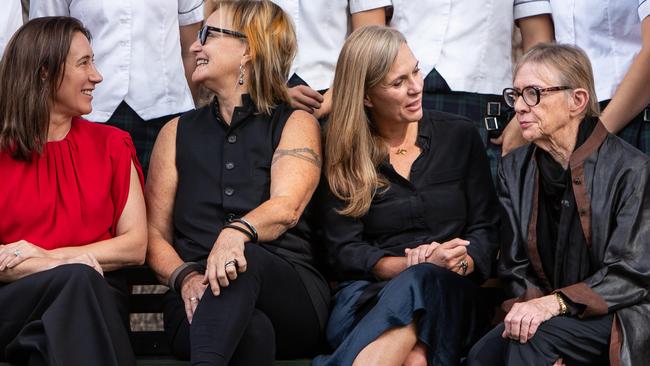Key questions from The Australian panel with Sydney girls’ school
Key Questions: Caroline Overington, Edwina McCann and former Supreme Court of NSW judge Carolyn Simpson share insights.

Discussion centred on education when The Australian and Sydney girls’ school PLC Sydney at Croydon combined for International Women’s Day.
Here are some of the key questions Caroline Overington, Edwina McCann and former Supreme Court of NSW judge Carolyn Simpson discussed
On maternity leave
Edwina McCann: (Rotating maternity leave) can present challenges for a business. If you’ve got five people off on maternity leave, you’ve obviously got to fill those roles. And then sometimes you have very excellent people doing that leave cover and then what do you do with those excellent people when the person comes back and they no longer have a job? But I think one of the challenges is for corporations to understand that is just part of our social responsibility. There is now a program under paid parental leave provisions of Fair Work called Keeping in Touch Days where people can come back for a few days here and there before they resume work and for which they are paid. I’ve actually found that quite effective. People have six or seven months off, then they often start to yearn to be back in touch with their job and they start to lose a little bit of confidence as well, and I have found that those who stay away for a year will often be quite lacking confidence when they come back, unsure whether or not they can do the job they used to do but also, I think, because the media environment, in particular, is evolving and being disrupted in such a huge way.
Christine Manfield: I decided not to have children (but) I think what we need to really broaden it out, make it flexible, make it economical, so all those sort of options can be available to people.
On journalism
Caroline Overington: If any among you are considering entering the profession of journalism today, I would say, absolutely go for it with everything you have. There have never been more opportunities than there are right now. You have magazines, you have websites, you have blogs, you have podcasts, you have documentaries and you have Netflix sucking up so much content that you could be doing all kinds of fascinating things for the range of topics we now cover. I mean, it used to be a little bit of business, a little bit of sport, a little bit of politics. Now, my goodness, you can go out there for six months, get yourself a grant from Screen Australia, do a true crime podcast, get it on Netflix, move to Hollywood. You’ve never had so much opportunity.
On technology
McCann: There are not enough women in the pipeline who are trained properly for jobs in technology. (I realised this) in two conversations — one with Mike Cannon-Brookes (co-founder of Atlassian). They simply can’t find enough women to fill the roles that they have available. And Westpac is also committed to gender parity and they just can’t achieve that in their IT sector because there aren’t enough women coming through with some idea of computer engineering. Technology is going to touch every single career, so it’s something you have to be literate in and you have to take it seriously. And I think that technology is going to be part of the solution to the problem (of childcare). Technology is what’s going to make it more flexible for women, for example, to work from home. So that’s an area I would encourage every girl in this room to be looking closely at when you look at the make-up of your university degree. Make sure you are have an interest in technology.
On career paths
McCann: I actually studied architecture in the beginning at university. I do remember sitting on my mother’s bed reading Vogue Living. And my dream
was to be the youngest editor ever, which I didn’t achieve.
So I guess I knew then what I wanted. (I wonder sometimes) how did I get here? But when
I think back, I know how I got here: I got there because I just worked so hard. And I didn’t say no. And I never said anything was not my job ever. Also, in
a corporate environment, financial literacy is power.
You have to understand numbers. You have to understand a P&L.
Simpson: I would never have dreamt that I would be a lawyer. Women weren’t (back then). I was in a tiny little country town in the central west of NSW and women, if women had jobs, were in teaching or nursing. It never occurred to me, even when I was at this school, that I would do a law course and certainly
I never dreamt I would become
a judge. So yes, it still sometimes shocks me.
For the full conversation go to theaustralian.com.au


